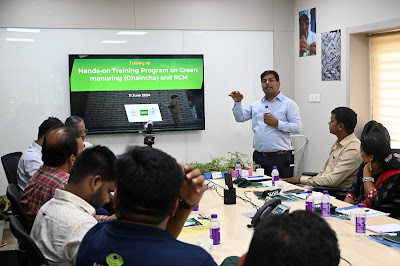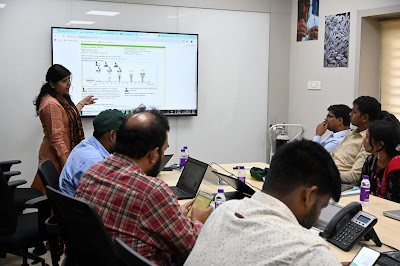- IRRI promotes enhanced crop and soil productivity through the balanced use of chemical and organic fertilizers.
- IRRI and the Odisha Department of Agriculture and Farmers’ Empowerment trained department-selected staff on dhaincha seed production and green manuring.
- The staff will share the benefits of dhaincha and organic fertilizer in rice-based cropping systems with farmers.
The Odisha Department of Agriculture and Farmers’ Empowerment (DA&FE) promotes cultivating dhaincha and organic fertilizer to improve farmers' productivity and ensure the sustainability of the state’s agriculture sector.
Dhaincha (Sesbania aculeata) is a leguminous plant that enriches the soil by fixing atmospheric nitrogen through its root nodules. When incorporated into the soil, dhaincha increases nitrogen levels and boosts organic carbon content, significantly enhancing soil fertility. Farmers can use this practice in integrated nutrient management (INM), which blends chemical and organic fertilizers in rice-based cropping systems.
Since 2021, under the Climate Smart Rice-based Systems for Prosperity and Resilience in Odisha (Climate-PRO) Project, IRRI has advocated INM to help optimize nutrient-use efficiency and promote sustainable agricultural practice in areas with irrigation during the rabi (dry) season. IRRI's INM strategy involves using 75% inorganic and 25% organic fertilizers, such as green manure from dhaincha and other leguminous crops, to enhance soil nitrogen content, improve nutrient-use efficiency, and minimize environmental losses.
DA&FE and IRRI trained selected department staff on dhaincha seed production and green manuring. The training seeks to empower Odisha's farmers to enhance soil health, boost crop yields, and adopt more sustainable agricultural practices by promoting the use of dhaincha as part of INM.
The trained staff will educate farmers on the benefits of incorporating dhaincha and organic fertilizers into their rice-based cropping systems, utilizing cultivable but unused lands for dhaincha seed production, and facilitating community initiatives encouraging farmers’ associations to use the seeds in subsequent seasons.
"Through INM, IRRI aims to reduce dependency on chemical fertilizers, improve soil fertility, and reduce greenhouse gas emissions from rice fields, thereby contributing to the goal of sustainable rice production in Odisha," said Dr. Mukund Variar, IRRI's state coordinator in Odisha.
###
Learn more about IRRI (www.irri.org) or follow us on social media and networks (all links down the right column).





No comments:
Post a Comment